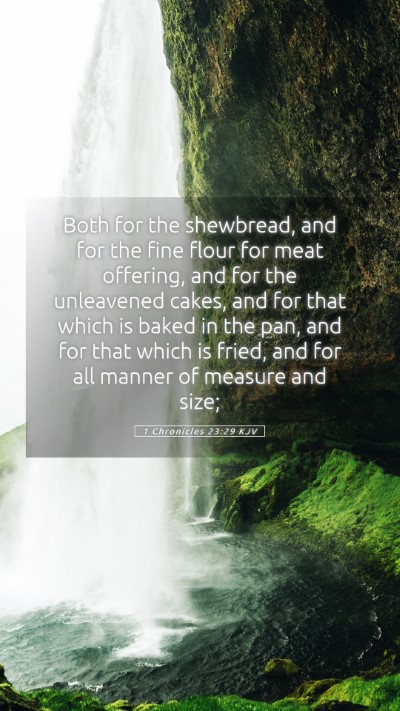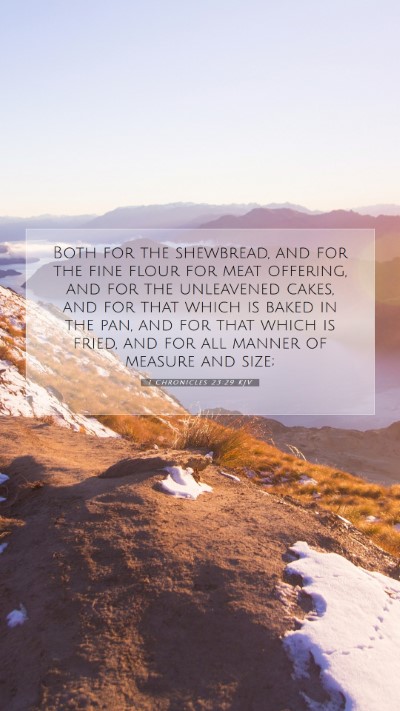Bible Verse Meaning: 1 Chronicles 23:29
Verse: 1 Chronicles 23:29 - “Both for the showbread, and for the fine flour for meat offering, and for the unleavened cakes, and for the pan of sweet incense, and for the place of the sacrifice of every sweetness, they were to stand every morning to thank and praise the Lord, and likewise at even.”
Overview of 1 Chronicles 23:29
This verse provides insight into the responsibilities of the Levites concerning the offerings and service in the temple. It emphasizes the significance of the duties assigned to the priests and the importance of gratitude and praise in worship.
Bible Verse Explanations
-
Matthew Henry's Commentary:
Matthew Henry notes that the Levites had specific duties concerning the offerings, emphasizing the law of God that established these responsibilities. Their tasks were not merely ritualistic but were rooted in the need to maintain a consistent relationship with God through daily offering and praise. This systematic approach to worship illustrates the importance of order and dedication in religious practices.
-
Albert Barnes' Commentary:
Albert Barnes highlights that this verse touches upon the various offerings made to God, including showbread and sweet incense. He points out that the meticulous attention to these details shows God's desire for a relationship with His people that is sincere and ongoing. The act of thanking and praising every morning and evening underscores the idea of continuous worship and dedication.
-
Adam Clarke's Commentary:
According to Adam Clarke, this verse signifies the perpetual obligation of the priests and Levites to offer sacrifices and praise. He draws attention to the spiritual significance of the offerings, symbolizing sustenance from God and the communal aspect of worship among the Israelites. The emphasis on daily thanksgiving indicates a lifestyle of gratitude that aligns the hearts of the worshipers with God's provision.
Understanding Scripture: Key Insights
1 Chronicles 23:29 encapsulates several important themes in biblical worship:
- The Role of the Levites: The Levites were set apart for specific duties related to the temple and the worship of God. This verse highlights their responsibility in maintaining the offerings and leading the people in worship.
- The Importance of Offerings: The offerings mentioned are crucial in the context of the Mosaic Law, representing the people's gratitude to God and their recognition of His provision. These offerings reflect a heart aligned with God's commandments.
- Continuous Worship: The call to thank and praise God each morning and evening reflects a model for all believers. It emphasizes that worship should not be confined to certain times but should be woven into the fabric of daily living.
Bible Study Insights
This verse can serve as a powerful lesson for Bible study groups focused on:
- Exploring the symbolism of Old Testament offerings
- Understanding the historical context of temple worship
- Implementation of gratitude in daily life based on scripture
Application of 1 Chronicles 23:29 in Daily Life
As guided by the motivations behind this verse, believers today are reminded of the importance of:
- Offering their time and resources to God in service
- Engaging in daily prayers of thanksgiving
- Fostering a lifestyle of worship that consistently acknowledges God's hands in their lives
Related Bible Cross References
- Exodus 25:30 - Importance of the showbread in the tabernacle
- Leviticus 2:1-2 - Offerings of grain and their significance
- Psalm 50:14-15 - Call to offer thank offerings to God
Conclusion: The Significance of 1 Chronicles 23:29
This verse encapsulates the essence of thanksgiving and worship within the context of the Israelite community. By understanding the meticulous practices of the Levites and their symbolism, believers are encouraged to cultivate a daily rhythm of gratitude and praise in their own lives, reinforcing a connection to the historical foundation of worship and the centrality of God in their daily activities.
Overall, 1 Chronicles 23:29 serves as a powerful reminder of the relationship between ritual and reverence in worship, offering profound insights and applications for modern believers seeking to understand scripture interpretations and deepen their Bible study.


